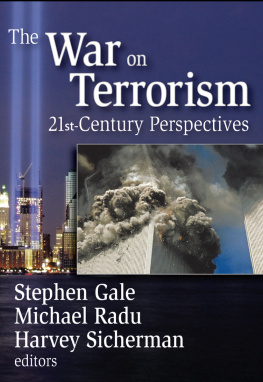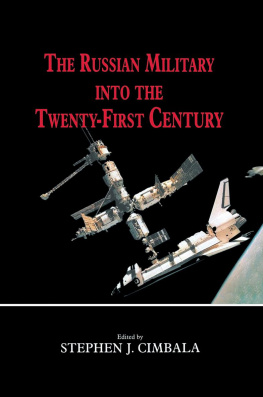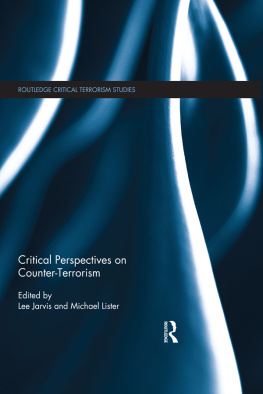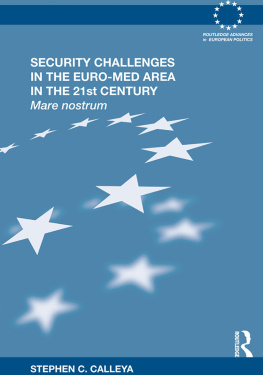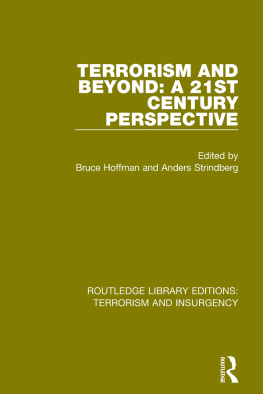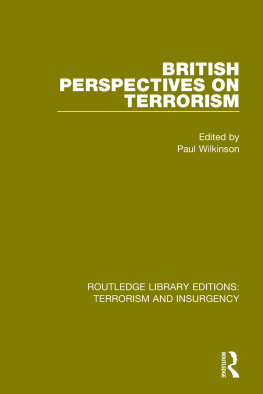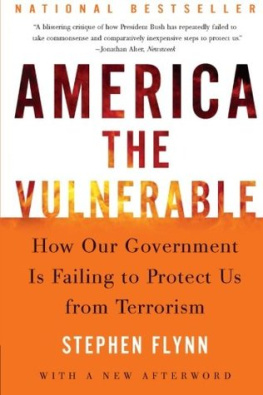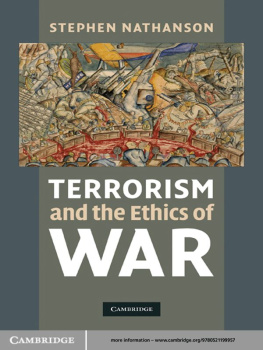First published 2009 by Transaction Publishers
Published 2017 by Routledge
2 Park Square, Milton Park, Abingdon, Oxon OX14 4RN
711 Third Avenue, New York, NY 10017, USA
Routledge is an imprint of the Taylor & Francis Group, an informa business
Copyright 2009 by Taylor & Francis.
All rights reserved. No part of this book may be reprinted or reproduced or utilised in any form or by any electronic, mechanical, or other means, now known or hereafter invented, including photocopying and recording, or in any information storage or retrieval system, without permission in writing from the publishers.
Notice:
Product or corporate names may be trademarks or registered trademarks, and are used only for identification and explanation without intent to infringe.
Library of Congress Catalog Number: 2008016493
Library of Congress Cataloging-in-Publication Data
The war on terrorism : 21st-century perspectives / Stephen Gale, Michael Radu, Harvey Sicherman, editors.
p. cm.
Includes bibliographical references.
ISBN 978-1-4128-0837-8
1. War on Terrorism, 2001- 2. TerrorismUnited StatesPrevention. 3. TerrorismGovernment policyUnited States. I. Gale, Stephen. II. Radu, Michael. III. Sicherman, Harvey.
HV6432.W372 2008
363.3251560973--dc22
2008016493
ISBN 13: 978-1-4128-0837-8 (pbk)
On September 11, 2001, a small number of desperate men hoping to earn paradise attacked New York and Washington, D.C. Their spectacular acts of destruction concluded Americas nearly decade-long vacation from insecurity, known as the post-Cold War era. As eras go, this one was quite short and it certainly ended with a bang, not a whimper.
The United States, still sole superpower, was now challenged by what I have called a bleak new world. Americans do not care for the bleak and do not tolerate it for long. Predictably, national shock soon became righteous anger, coupled to international campaigns against groups and states held responsible for the scourge of terrorism. These were short-term measures that hurt our enemies but did not fix the problem or allow us to resume our vacation.
The late Robert Strausz-Hup, founder of the Foreign Policy Research Institute, whose eventful life spanned the twentieth century, caught the reality we were loath to face in the initial flush of retaliation. This was going to be a new protracted conflict like the Cold War, he wrote in the introduction to the Spring 2002 issue of Orbis, which was devoted to the new conflict (his introduction is included herein), against a dangerous and ultimately implacable ideology that would be settled with the defeat of one or the other. And, if that were the case, we had to gird ourselves psychologically, morally, and intellectually for the contest. America certainly had the resources to prevail. Did we have the wisdom or the patience?
FPRI was founded to equip the United States intellectually for such challenges to our national security and, in this case, to our very democracy, our political culture, and our sense of human values. In the wake of 9/11, we decided not simply to take our regular programs of research, education, and publication, and modify them to take on a new issue, but rather to create a new Center on Terrorism, Counterterrorism, and Homeland Security. The Centers purpose is to develop public policy suggestions on this issue using the best of scholarship available to us. By including homeland security among the subjects, we expressed a central theme: in this war the front was everywhere. In the absence of homeland defenses, the United States would remain vulnerable to repeats of 9/11, no matter how successful we might press the terrorists abroad.
The Center, funded in part by the Commonwealth of Pennsylvania, takes a broad, three-dimensional approach:
Know the enemy: | intentions, capabilities, tactics |
Know ourselves: | American strengths and weaknesses |
Know our friends: | other states allied in the war on terror and the roles they might play |
Since its establishment, the Centers scholars, ably guided by co-chairs Prof. Stephen Gale of the University of Pennsylvania and FPRI Senior Fellow Dr. Michael Radu, have produced numerous analyses and suggestions on these topics, covering political, military, economic, and diplomatic dimensions. In combination with the Institutes Marvin Wachman Fund for International Education, the Center has also done significant work in helping secondary school teachers to inform young Americans about terrorism.
Among our major achievements:
(1) Development of the Security Impact Statement, a device available for public and private risk-assessment analysts that facilitates the efficient use of homeland security resources to protect vital infrastructure.
A dossier database of critical information about groups that advocate terrorism and violent political change.
Analysis of the critical condition of the U.S. militarys Reserves system and recommendations to fix this vital part of American military strength and civic participation in our defense.
Development of a model reading list and curricula suggestions for teaching about the war on terror.
Finally, we have inaugurated an annual conference (the first was held in December 2006) that brings together experts in all aspects of the war on terror to provide assessment of where we are and what we need to do.
The essays collected within this volume, we hope the first in a series, will give the reader an idea of the range and depth of the Centers work. A bibliography is provided noting many more important pieces from Orbis and elsewhere on these subjects. More importantly, this volume helps to fulfill the FPRIs overall mission not only to describe an issue but also to suggest public policy that advances the causes of American ideals and interests.
To manage post-9/11 threats to its security, America has to undertake a complete revision of its national strategy to make sure its economic, energy, and military policies support this. The following essays present some of the thinking of our American Strategy project.
In 1959 I wrote a book called Protracted Conflict, which became my most popular work. Perhaps this was because the central idea spoke to the times and because, although a professor, I did not let too much learning interfere with the theme.
What I proposed was simply that after a dozen years of Cold War between the United States and the Soviet Union, a pattern was in place that would continue until one side or the other was transformed. Either the United States would cease to be a democracy or the Soviet Union would cease to be a Leninist dictatorship. The ideological divide was too deep and wide for any lasting peace, and while tensions might grow or diminish, these were tactical decisions dictated by geopolitical convenience, not strategic changes. Try as Western statesmen might to bridge this divide with dtente or, from the Soviet side, with the ideological sleight of hand called peaceful coexistence, the conflict would not end until one side or the other triumphed.
I thought it was supremely important for Americans and their statesmen to understand that we were in for a protracted conflict. This ran against our national preference for quick solutions and our tendency to believe that goodwill and money would always turn an enemy into a friend. We would have to stay alert, dispense with illusions about the other side, and keep ourselves mobilized. It would indeed be a severe test of our democracy to prevail.


